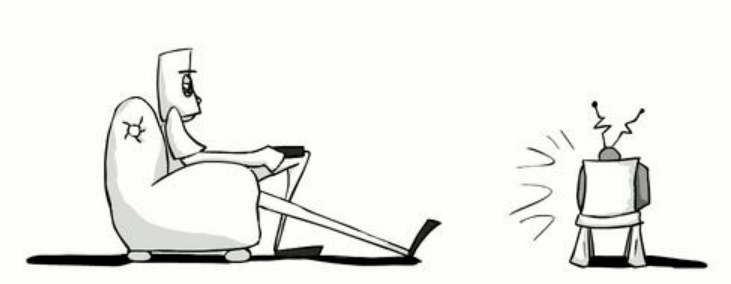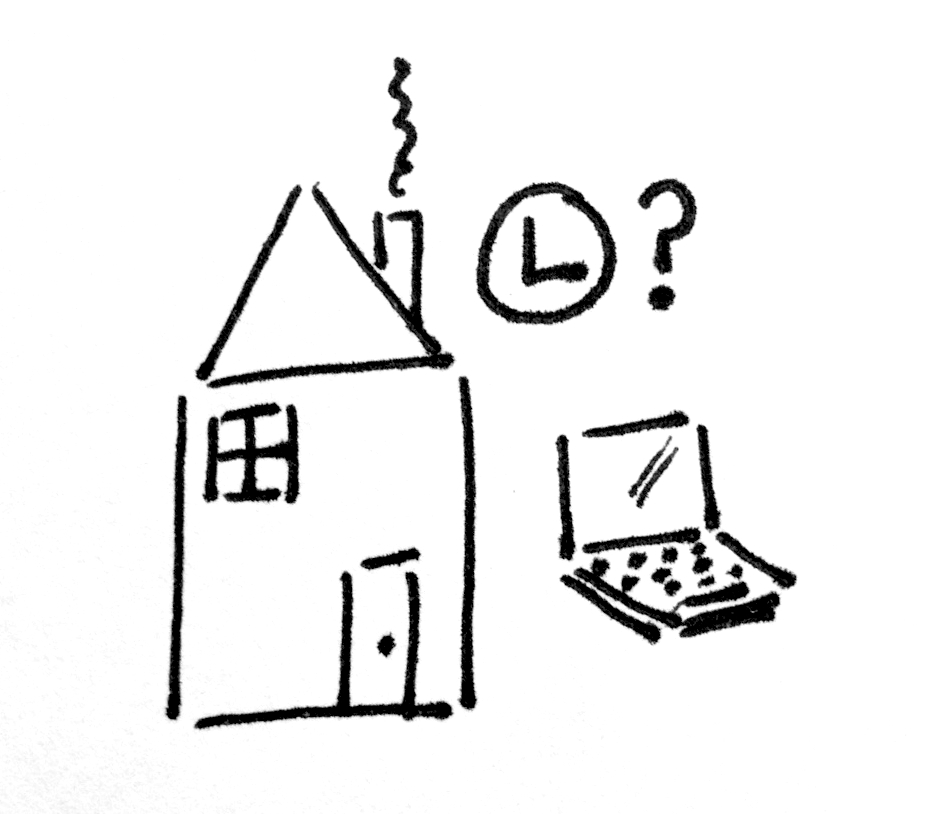Strangely as it seems, too many options block our ability to choose. A good to-do list, one that really guides us towards high value activities, must take into account this effect. Our feeling of freedom, and our freedom of choice, will definitely require renegotiating agreements with ourselves.
Don't ignore your inner voices of complain: hear them and decide.
Don't ignore your inner voices of complain: hear them and decide.
Paradox of choice
In his insightful book "The Paradox of Choice", Barry Schwartz presents us with an incredible number of experiments and studies showing what may seem an awkward conclusion: raising the number of options above a certain point tends to block the ability to choose and decreases overall benefits.
As an example, in one of the studies, a group of people participate in an experiment, at the end of which are offered a small token of appreciation. They have a choice there. They can choose 2 dollars or a nice pen with the school logo, which is actually available for 2,5 dollars at the school store. Roughly 75% chose the nice pen over the money.
With another similar but unrelated group, a third option is introduced. After the experiment, along with the same 2 dollars and the same nice pen, people in this group now also have a couple of cheaper pens as a third alternative. Maybe you would assume that at least 75% of them choose either the same pen option (which proved better than the money) or eventually the new pen option (if even better than the initial pen).
The result went clearly against the obvious: now only 45% of people chose any of the pen options, raising from previous 25% to 55% of people choosing the money! Just because there was a third option, what seemed a well preferred choice in the first scenario became a dilemma: if I take the nice pen, I'm letting go of the two cheaper ones, and vice-versa. The perceived cost of letting go one of them actually subtracts from the satisfaction of the one you choose. That pushed people into the least committed choice: the money.
A simple analogy may be worth the thought: if you have two very important tasks on your to-do list in front of you, both needing your conclusive effort, what do you choose? Do you hit the first one and risk leaving the second one behind, as important as it is? Or maybe you start by that one, but isn't the first one too valuable to stand waiting? Then something mysteriously pushes you away from the commitment dilemma: 'let me just check my e-mail first'!!
No-choice options and liability
I like to call this the "no-choice" option. No-choice options are widely noticeable all around us. They can keep us zapping for hours, without truly committing to any show at all. It can keep the PC on our lap while we see some TV show, not really doing the report, neither feeling free to really stop working and enjoy TV f or real. It can keep us the whole weekend thinking about maybe doing some work, without actually doing any work at all, neither really relaxing about that option. It can happen after dinning out with friends and the long process of deciding which bar to go next ends up in no bar at all. It could happen choosing whether or not to stay in your relationship, or in your job, so you keep them until you're really really sure. In fact, not choosing can be incredibly comfortable compared with the possible regret of leaving a good option behind.
or real. It can keep us the whole weekend thinking about maybe doing some work, without actually doing any work at all, neither really relaxing about that option. It can happen after dinning out with friends and the long process of deciding which bar to go next ends up in no bar at all. It could happen choosing whether or not to stay in your relationship, or in your job, so you keep them until you're really really sure. In fact, not choosing can be incredibly comfortable compared with the possible regret of leaving a good option behind.
The important thing here is that, intuitively, I may feel that I'm less liable for my situation when I don't choose, or better, when I choose a "no-choice" option. It's as if taking a step forward with a choice makes me more responsible for what may happen (and for eventual failure), where as "not choosing" makes it more of a "world's" responsibility (you did nothing).
No-choice vs choosing "not to" - the real freedom of choosing
While no-choice options may seem comfortable, they prove to be tricky sometimes. It really depends whether the inner part of you that is complaining was "heard" or not. Depends if it gets some kind of agreement with yourself. Without it, it will keep complaining, in a quite, silent but restless way. Let me give you an example.
Imagine your e-mail inbox is a mess (maybe that's not very hard to imagine). A mountain of e-mails, many unread, many representing non-urgent important issues, some urgent "clock bombs" ready to explode, all mixed up. Now imagine that some inner part of you feels a little bit "guilty" for not putting order in that chaos. Imagine that, because your days have been very demanding, most times you contact with that chaos feeling you should be doing something about it, but don't have the time, or something else always wins your attention. You just avoid it (doesn't really matter now exactly why you are avoiding it). Imagine you spend a whole week escaping that, without truly doing anything at all about it.
Now, there are two ways of not doing anything about that inbox during that whole week: the no-choice way and the "choosing not to" way. In the first one, you just drift around, thinking you should do it, but you don't. Each time you look at it, you feel a micro guilty feeling, but you never really choose you won't do it, you just kind of happen not to do it.
You see, if you decide you won't, that's a completely different game. You assume it's a choice. You are aware of the risk, but you decide, you freely take a step forward on a different option. You heard your inner voice telling you "you should", you weighted pros and cons, and the decision was: I'm not going to invest my time in that, at least not until tomorrow, then we'll see. And that's establishing an agreement with yourself. Actually it's renegotiating a tacit agreement of something like "having things in order". The part of you that finds value in that was heard, but lost the trial. At least for now, until tomorrow's "court hearing". In the previous case, there was no trial: and your inner voice didn't really "loose", it just hasn't been conclusively heard, and will keep trying to, every time you look at or remember the mess.
You heard your inner voice telling you "you should", you weighted pros and cons, and the decision was: I'm not going to invest my time in that, at least not until tomorrow, then we'll see. And that's establishing an agreement with yourself. Actually it's renegotiating a tacit agreement of something like "having things in order". The part of you that finds value in that was heard, but lost the trial. At least for now, until tomorrow's "court hearing". In the previous case, there was no trial: and your inner voice didn't really "loose", it just hasn't been conclusively heard, and will keep trying to, every time you look at or remember the mess.
Exactly the same thing can happen with your garage, or that picture you want to hang in the wall, the broken lamp, or with anything in a "pool of opportunities" we all have. Please note I said "pool of opportunities", not "pool of obligations", and that's a mindset worth reflecting about a bit more...
On my next article, I'll be covering how choices can turn easier as we clear Success Criteria and escape Perfeccionism...
Until then, try a trick!
As an example, in one of the studies, a group of people participate in an experiment, at the end of which are offered a small token of appreciation. They have a choice there. They can choose 2 dollars or a nice pen with the school logo, which is actually available for 2,5 dollars at the school store. Roughly 75% chose the nice pen over the money.

With another similar but unrelated group, a third option is introduced. After the experiment, along with the same 2 dollars and the same nice pen, people in this group now also have a couple of cheaper pens as a third alternative. Maybe you would assume that at least 75% of them choose either the same pen option (which proved better than the money) or eventually the new pen option (if even better than the initial pen).
The result went clearly against the obvious: now only 45% of people chose any of the pen options, raising from previous 25% to 55% of people choosing the money! Just because there was a third option, what seemed a well preferred choice in the first scenario became a dilemma: if I take the nice pen, I'm letting go of the two cheaper ones, and vice-versa. The perceived cost of letting go one of them actually subtracts from the satisfaction of the one you choose. That pushed people into the least committed choice: the money.
A simple analogy may be worth the thought: if you have two very important tasks on your to-do list in front of you, both needing your conclusive effort, what do you choose? Do you hit the first one and risk leaving the second one behind, as important as it is? Or maybe you start by that one, but isn't the first one too valuable to stand waiting? Then something mysteriously pushes you away from the commitment dilemma: 'let me just check my e-mail first'!!
No-choice options and liability
I like to call this the "no-choice" option. No-choice options are widely noticeable all around us. They can keep us zapping for hours, without truly committing to any show at all. It can keep the PC on our lap while we see some TV show, not really doing the report, neither feeling free to really stop working and enjoy TV f
 or real. It can keep us the whole weekend thinking about maybe doing some work, without actually doing any work at all, neither really relaxing about that option. It can happen after dinning out with friends and the long process of deciding which bar to go next ends up in no bar at all. It could happen choosing whether or not to stay in your relationship, or in your job, so you keep them until you're really really sure. In fact, not choosing can be incredibly comfortable compared with the possible regret of leaving a good option behind.
or real. It can keep us the whole weekend thinking about maybe doing some work, without actually doing any work at all, neither really relaxing about that option. It can happen after dinning out with friends and the long process of deciding which bar to go next ends up in no bar at all. It could happen choosing whether or not to stay in your relationship, or in your job, so you keep them until you're really really sure. In fact, not choosing can be incredibly comfortable compared with the possible regret of leaving a good option behind.The important thing here is that, intuitively, I may feel that I'm less liable for my situation when I don't choose, or better, when I choose a "no-choice" option. It's as if taking a step forward with a choice makes me more responsible for what may happen (and for eventual failure), where as "not choosing" makes it more of a "world's" responsibility (you did nothing).
No-choice vs choosing "not to" - the real freedom of choosing
While no-choice options may seem comfortable, they prove to be tricky sometimes. It really depends whether the inner part of you that is complaining was "heard" or not. Depends if it gets some kind of agreement with yourself. Without it, it will keep complaining, in a quite, silent but restless way. Let me give you an example.
Imagine your e-mail inbox is a mess (maybe that's not very hard to imagine). A mountain of e-mails, many unread, many representing non-urgent important issues, some urgent "clock bombs" ready to explode, all mixed up. Now imagine that some inner part of you feels a little bit "guilty" for not putting order in that chaos. Imagine that, because your days have been very demanding, most times you contact with that chaos feeling you should be doing something about it, but don't have the time, or something else always wins your attention. You just avoid it (doesn't really matter now exactly why you are avoiding it). Imagine you spend a whole week escaping that, without truly doing anything at all about it.
Now, there are two ways of not doing anything about that inbox during that whole week: the no-choice way and the "choosing not to" way. In the first one, you just drift around, thinking you should do it, but you don't. Each time you look at it, you feel a micro guilty feeling, but you never really choose you won't do it, you just kind of happen not to do it.
You see, if you decide you won't, that's a completely different game. You assume it's a choice. You are aware of the risk, but you decide, you freely take a step forward on a different option.
 You heard your inner voice telling you "you should", you weighted pros and cons, and the decision was: I'm not going to invest my time in that, at least not until tomorrow, then we'll see. And that's establishing an agreement with yourself. Actually it's renegotiating a tacit agreement of something like "having things in order". The part of you that finds value in that was heard, but lost the trial. At least for now, until tomorrow's "court hearing". In the previous case, there was no trial: and your inner voice didn't really "loose", it just hasn't been conclusively heard, and will keep trying to, every time you look at or remember the mess.
You heard your inner voice telling you "you should", you weighted pros and cons, and the decision was: I'm not going to invest my time in that, at least not until tomorrow, then we'll see. And that's establishing an agreement with yourself. Actually it's renegotiating a tacit agreement of something like "having things in order". The part of you that finds value in that was heard, but lost the trial. At least for now, until tomorrow's "court hearing". In the previous case, there was no trial: and your inner voice didn't really "loose", it just hasn't been conclusively heard, and will keep trying to, every time you look at or remember the mess.Exactly the same thing can happen with your garage, or that picture you want to hang in the wall, the broken lamp, or with anything in a "pool of opportunities" we all have. Please note I said "pool of opportunities", not "pool of obligations", and that's a mindset worth reflecting about a bit more...
On my next article, I'll be covering how choices can turn easier as we clear Success Criteria and escape Perfeccionism...
Until then, try a trick!
Gonçalo Gil Mata
www.WhatsTheTrick.com
NOW TRY A TRICK!...

|T| Define homework..>>
see more TRICKS - vote and comment on them!



